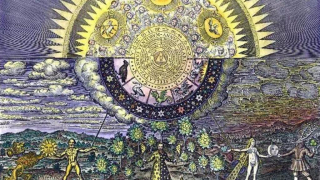Religious Liberty or a Christian Culture?
You can’t have both. What is happening in Texas over her new pro-life heartbeat law is proof. The Satanic Temple’s arguments against it, given just below, though gruesome and abhorrent, cannot be refuted by appeals to the exercise of an agnostic religious freedom. It is, in fact, the very tool they are using to try to overturn the heartbeat law:
‘The controversial Texas heartbeat bill, which bans most abortions in the state after six weeks' gestation, is now under attack from the Massachusetts-based group The Satanic Temple, which argues that the law infringes on the group’s religious freedom by imposing an “undue burden” on its "satanic abortion ritual."
‘“The Texas Religious Freedom Restoration Act (TRFRA) provides a mechanism to seek an exemption from any law that restricts the free exercise of religion. Because S.B. 8 imposes an undue burden on the ability of TST members to undergo the Satanic Abortion Ritual, the first step in defending the rights of its members is to seek an exemption under TRFRA. If the state declines to provide such an exemption, TST can then seek judicial relief from the law,” the organization said in a statement shared on its website.
‘ . . .
‘In a letter to the Food and Drug Administration last Tuesday, Matthew A. Kezhaya, an attorney for The Satanic Temple, asked that the organization be given a religious exemption to access the abortion-inducing drugs mifepristone and misoprostol without a prescription as part of its “sacramental” abortion ritual.
‘“TST’s membership uses these products in a sacramental setting. The Satanic Abortion Ritual is a sacrament which surrounds and includes the abortive act. It is designed to combat feelings of guilt, doubt, and shame and to empower the member to assert or reassert power and control over their own mind and body. The REMS prescription requirement substantially interferes with the Satanic Abortion Ritual because the Government impedes the members’ access to the medication involved in the ritual,” the letter noted.
‘Kezhaya suggested that the exemption for the group to use the abortion drugs would be similar to the use of peyote in certain Native American rituals under the Religious Freedom Restoration Act.
‘“I am sure Texas Attorney General Ken Paxton — who famously spends a good deal of his time composing press releases about Religious Liberty issues in other states — will be proud to see that Texas’ robust Religious Liberty laws, which he so vociferously champions, will prevent future Abortion Rituals from being interrupted by superfluous government restrictions meant only to shame and harass those seeking an abortion," Lucien Greaves, a spokesman and co-founder of The Satanic Temple, noted in a statement to The Christian Post.
‘“The battle for abortion rights is largely a battle of competing religious viewpoints, and our viewpoint that the nonviable fetus is part of the impregnated host is fortunately protected under Religious Liberty,” Greaves added.
‘ . . .
‘“S.B. 8 does not allow for lawsuits or enforcement of penalties against a woman seeking an abortion. Instead, S.B. 8 is cynically designed to avoid judicial review of the law and creates enforcement mechanisms against TST and its lawyers who dare challenge the law. We will not be cowed into silence by an unjust law or a tyrannical state government,” they said.’
The Texas Constitution doesn’t offer much help for Christians who rightly oppose the Satanists. Here is what it offers:
‘Sec. 6. FREEDOM OF WORSHIP. All men have a natural and indefeasible right to worship Almighty God according to the dictates of their own consciences. No man shall be compelled to attend, erect or support any place of worship, or to maintain any ministry against his consent. No human authority ought, in any case whatever, to control or interfere with the rights of conscience in matters of religion, and no preference shall ever be given by law to any religious society or mode of worship. But it shall be the duty of the Legislature to pass such laws as may be necessary to protect equally every religious denomination in the peaceable enjoyment of its own mode of public worship.’
--Texas Constitution, Article 1
By the standard enshrined in this section, the deeply held beliefs of a devil-worshipper are to be honored just as much as those of a Christian. Indeed, it is ‘the duty of the Legislature . . . to protect equally every religious denomination’ – it matters not whether it is Satanic or Christian or Buddhist or etc.
Christians in the States, if they want their faith to continue in existence and to grow stronger in future generations, must admit that this ideology of ‘religious freedom’ is a liability. Not only does it promote moral relativism, but it makes it impossible to defend laws rooted in Christianity against the kinds of lawsuits now being initiated by the Satanic Temple.
Its weakness lies partly in its acceptance of the lie that society arises from a social contract drawn up and agreed upon by completely autonomous individuals to protect the rights of each. But this is not the origin of a sane society, of a common culture shared and practiced by all. Dr Russell Kirk writes,
‘From what source did humankind’s many cultures arise? Why, from cults. A cult is a joining together for worship—that is, the attempt of people to commune with a transcendent power. It is from association in the cult, the body of worshippers, that human community grows. This basic truth has been expounded in recent decades by such eminent historians as Christopher Dawson, Eric Voegelin, and Arnold Toynbee.
‘Once people are joined in a cult, cooperation in many other things becomes possible. Common defense, irrigation, systematic agriculture, architecture, the visual arts, music, the more intricate crafts, economic production and distribution, courts and government—all these aspects of a culture arise gradually from the cult, the religious tie.’
--‘Civilization without Religion?’
And elsewhere he says,
‘As Dawson put it in his Gifford Lectures of 1947,
‘“A social culture is an organized way of life which is based on a common tradition and conditioned by a common environment. . . . It is clear that a common way of life involves a common view of life, common standards of behavior and common standards of value, and consequently a culture is a spiritual community which owes its unity to common beliefs and common ways of thought far more than to any unanimity of physical type. . . . Therefore from the beginning the social way of life which is culture has been deliberately ordered and directed in accordance with the higher laws of life which are religion.”’
Pluralistic religious freedom undermines this social cohesion. Christians in the United States, unfortunately, must re-learn the lessons of Church history in order to protect what is left of Christian culture within them. And one of the main lessons is that some kind of official government sanction of or preference for Christianity is helpful for its continuance and flourishing.
One of the greatest emperors of New Rome, St Justinian the Great (+565), gives a sober defense of this arrangement:
‘Justinian based his ecclesiastical policies on the principle of harmony (symphonia) between Church and State. According to this principle, these two sources of authority are not derived from the people but from above, from the source of all authority, i.e., God. Having the same source, these authorities, if correctly exercised, cannot come into conflict with one another. The fact that the community of the Church and of the State in Byzantium were the same necessitated the agreement of the Church and the State. It was unthinkable to have in one and the same community two opposing authorities exercised simultaneously. The Church was as the soul, the State was as the body. The healthy union of these two organisms was considered by Justinian to be a necessary presupposition for each of these organisms, as only thus could harmonious collaboration take place. The purpose of both these organisms was the same, i.e., the salvation of the people and the glory of God. Hence, it was considered unthinkable to have a conflict between the Church and the State, as, otherwise, it would signify a differentiation of purpose’ (Asterios Gerostergios, Justinian the Great: The Emperor and Saint, Institute for Byzantine and Modern Greek Studies, Belmont, Mass., 1982, p. 87).
Certain actions result from this understanding of Christian society, one of them being that sometimes the government must act decisively against certain groups or individuals in order to protect the Christians from harmful influences. St Justinian so acted when he closed the Athenian School of Philosophy:
‘As a Christian ruler and a faithful member of the Church of that time, he could not support financially and protect people teaching theories intended to overthrow the prevailing religion and capable of causing excitement of the populace and disorder in the State’ (Gerostergios, p. 73).
The same principle is seen at work in smaller, quieter places, too. Tsar-Saint Boris-Michael of Bulgaria (+907), after laboring diligently to convert his people to the Orthodox Faith, left the throne and entered a monastery to prepare himself for death. However, it is recounted in the acts his life that
‘While in the monastery the saint learned that Vladimir, who succeeded him, had renounced Christianity. Distressed by this, Saint Boris again donned his military garb, punished his disobedient son and threw him in prison. After giving the throne to his younger son Simeon, Saint Boris returned to the monastery.’
The foregoing could not be further from the conception of government that reigns in the minds of most people in the US, which we alluded to briefly above. Prof Thomas DiLorenzo’s formulation is classic:
‘This stands in stark contrast to the classical liberal idea that individuals have natural rights that pre-exist government; that government derives its “just powers” only through the consent of the governed; and that the principal function of government is to protect the lives, liberties, and properties of its citizens, not to aggrandize the state.’
This bit of post-Christian, ‘Enlightenment’ political dogma won’t shield Christians and their laws from the legal assaults of the Satanic Temple, the ACLU, and so on; the harsh reality is that it empowers the latter. The battle for Texas’s heartbeat bill won’t be won until Christianity is established, in some way or another (Poland and Hungary offer helpful recent examples), as the official religion of the State of Texas.










